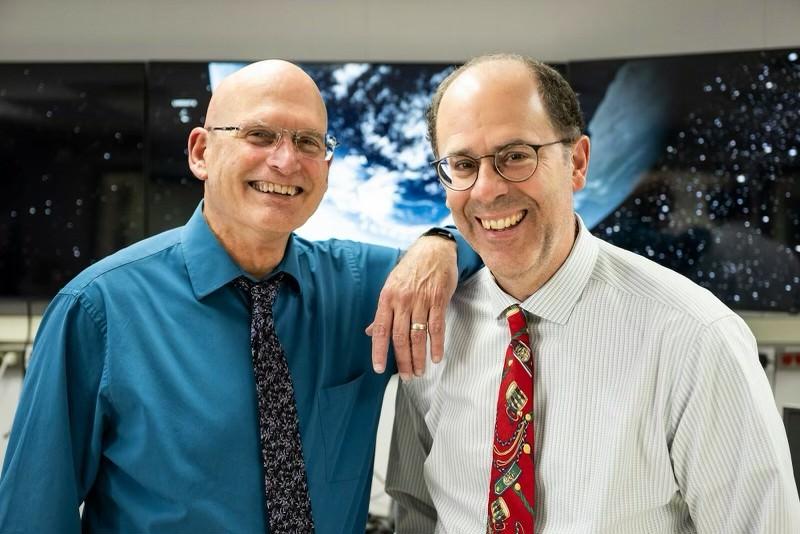Emeritus professor in the University of Wisconsin Department of Atmospheric and Oceanic Sciences Steve Ackerman and professor of AOS Jonathan Martin co-host “The Weather Guys.” It is a call-in show discussing all things weather, climate and science with former UW professor and long-time host Larry Meiller. The show’s 25 years of perseverance reflect the public’s long-time interest.
The show started in 1998 when the state meteorologist was out of town for a weekend. According to Ackerman, he and Martin asked Information Coordinator at the Space Science and Engineering Center of UW Madison Terri Gregory if they could guest host the slot. She agreed and they joined host Meiller to fill-in.
Ackerman said the first show was so successful Meiller invited them back when there was a space in the program. After about a year, the show became a regular segment and continues today from 11:45a.m. to 12:30p.m. the last Monday of each month.
Ackerman began his education in atmospheric science when a meteorologist friend took note of his interest in physics and told him to take a class on the subject. Ackerman said he took a liking to the subject, and his interest in teaching led him toward a role in graduate education. He earned his PhD at Colorado State studying the impacts of clouds, aerosols and water vapor in climate change.
New kidney transplant technique uses immune system to enhance recovery
Martin said his Northeast upbringing exposed him to massive snow storms. This experience, combined with his interest in physical science and math, steered his interest toward studying storm systems. He earned his PhD at the University of Washington studying the dynamics of cyclones.
Using their expertise, the hosts dissect and explain most of the questions and observations callers ask them about. Little eludes explanation for the Weather Guys and their 60 combined years of experiences in their respective fields. But Ackerman said the nature of the show means callers will bring observations that require complicated explanations.
Ackerman and Martin said the goal is to create understanding for listeners. During the course of the show, they discuss the weather events with Meiller, but the main component is answering questions from callers. Martin said if it’s other people asking the questions rather than the three of them discussing their ideas, the show will be more interesting for the audience.
“Probably about 10 years ago, somebody called in and asked about an ‘n’-shaped rainbow,” Ackerman said. “And I’m trying to think of it in my mind and I just can’t picture it … So I went through all of my optics books and there was one paragraph that mentioned you could get two rainbows and one [flip]. When sunsets happen over water, the sun off the lake becomes another source and you generate another rainbow, and you get an ‘n’-shaped rainbow.”
Thermal modeling allows researchers to study physiology of Triassic period animals
At its core, the show communicates the importance of weather and the field that studies it. Both Ackerman and Martin said the improvements of the often-criticized weather forecast are unheralded as a scientific achievement. They said the seven-day forecast has become more reliable than even a two or three day forecast a couple decades ago.
“Almost everything that has developed in the broad science has developed because of the effort pointed at forecasting,” Martin said. “It’s been a great success. Nobody pays attention to how good it has gotten because each succeeding generation depends on how good it is.”
The duo expanded to publishing a weekly column in the Wisconsin State Journal called “Ask the Weather Guys” in 2008. It covers topics ranging from current events in weather to new developments in the field, like the launch of the Tropospheric Emissions: Monitoring of Pollution satellite this past April.
Martin said he doesn’t shy away from callers who want to discuss the legitimacy of climate change. Engaging on the subject gives him a chance to set them right and specifically explain their concerns.
Department of Forest and Wildlife Ecology starts series off strong
“I want some climate-skeptic[s] to call us because it gives us the opportunity to say ‘Hey, glad you’re interested in this issue, but you’re kind of barking up the wrong tree on this issue’,” Martin said.
Beyond the show, Ackerman and Martin have held a variety of events across the state to bring their expertise and explanations anywhere from factory floors to retirement homes. Ackerman said he worked in UW’s Delta Program, a graduate program focused on educating aspiring teachers, mentors and researchers in a range of academic skills. Along with an expert in journalism, he co-lectured a class about communication for science.
The final contribution to the show’s success is both of the hosts’ enjoyment of it. Ackerman and Martin said the best part is getting callers who ask questions about the weather or share their stories about other weather-related experiences.
“Certainly everybody thinks about the weather in some way or another, if they admit it or not, they do,” Martin said. “When you have the whole state calling you to ask questions about the weather, you have no problem getting an interested audience.”


















